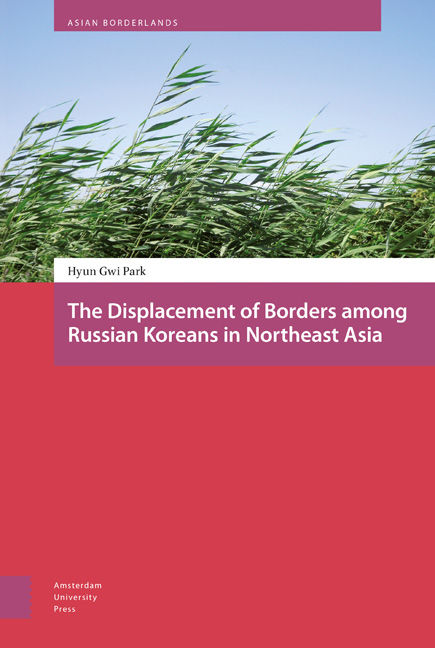Book contents
- Frontmatter
- Dedication
- Contents
- List of Maps, Figures and Tables
- Acknowledgements
- Note on transliteration, translation, and names
- Preface: Clearing the Ground
- Introduction: the Obscure Presence of Russian Koreans in Northeast Asia
- 1 The History of âthe Korean Questionâ and Border-Making in the Russian Far East
- 2 Repatriating to the Russian Far East, Confronting the Transition
- 3 Living Soviet Socialism the Korean way: Mobile Agriculture at the Border of Socialism
- 4 Greenhouse Society: the Subsistence Economy and Householding
- 5 Recalling History: Koreiskii Dom, Transnational Connections, and Diaspora Politics
- Epilogue
- Appendix 1
- Appendix 2
- Glossary
- Bibliography
- Index
1 - The History of âthe Korean Questionâ and Border-Making in the Russian Far East
Published online by Cambridge University Press: 12 February 2021
- Frontmatter
- Dedication
- Contents
- List of Maps, Figures and Tables
- Acknowledgements
- Note on transliteration, translation, and names
- Preface: Clearing the Ground
- Introduction: the Obscure Presence of Russian Koreans in Northeast Asia
- 1 The History of âthe Korean Questionâ and Border-Making in the Russian Far East
- 2 Repatriating to the Russian Far East, Confronting the Transition
- 3 Living Soviet Socialism the Korean way: Mobile Agriculture at the Border of Socialism
- 4 Greenhouse Society: the Subsistence Economy and Householding
- 5 Recalling History: Koreiskii Dom, Transnational Connections, and Diaspora Politics
- Epilogue
- Appendix 1
- Appendix 2
- Glossary
- Bibliography
- Index
Summary
I prefer a Russian desert to a Korean-made paradise. Governor-General of Priamur, P.F. Unterberger, in the early 1900s
(cited in Lee, 1998; Saveliev, 2010)Koreans obespechli (‘enriched’) the Russian Far East with an abundance of fish and vegetables. Now see what has happened here since they forced the Koreans out. Following their deportation, fish and vegetables became in short supply.
(T.A. Kim, from my field notes in August 2004)From the economic point of view the anti-Korean measures [forcible relocation] resulted in a clear disadvantage for the Soviet Far East, though not for the USSR as a whole.
(Kolarz, 1954, p. 40)With the Peking Treaty of 1860, Russia expanded its territory into East Asia and consequently gained a border with both China and Korea (see Map 1). Since then, the disparity between the region's remoteness from the Russian center of government and its proximity to East Asian countries has been a central issue in the colonisation of the RFE and the treatment of its residents who were originally from neighboring China and Korea. Whereas there has been a persistent and obvious negativity towards China and the Chinese – often phrased as the ugroza (‘threat’) or zheltaia opasnost’ (‘yellow peril’) – the representation of Korea and Koreans in the RFE has been characterised by greater ambiguity and complexity, and has come to be referred to by the simple but popular phrase, koreiskii vopros (‘the Korean question’).
The Korean question has been a complex aspect of the colonization of the RFE both during the Russian Empire and the Soviet Union; in this chapter, I argue that it is rooted in the regional problems, both domestic and international, with which Russian colonisers have struggled since their acquisition of the region. On the one hand, rather than being viewed simply as a threatening presence in the RFE, Koreans were seen as poleznyi (‘useful’) for colonizing a territory that was so remote from Moscow, especially for the development of arable land and the production of food, which was the main mode of colonisation in the Far East. On the other hand, the Korean Peninsula, from which Koreans originated, and Manchuria, from which many migrated, were continually at the center of international power conflicts that, due to their geographical proximity, inevitably affected the RFE.
- Type
- Chapter
- Information
- Publisher: Amsterdam University PressPrint publication year: 2017



